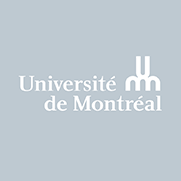
Eilif B. Muller
- Professeur sous octroi adjoint
-
Faculté de médecine - Département de neurosciences
Profile
Research expertise
Les domaines des neurosciences et de l'intelligence artificielle (IA) ont une longue histoire d'interactions bidirectionnelles fertiles. D'une part, des contributions importantes au développement de modèles et de théories de la perception sensorielle en neuroscience ont émergé de la recherche sur l'IA. D'autre part, une source d'inspiration importante pour le développement des systèmes d'IA est venue des neurosciences, l'étude des systèmes biologiques d'intelligence. Le programme de recherche poursuivi par le Laboratoire des architectures d'apprentissage biologique (ABL-Lab) est un programme interdisciplinaire, visant à élargir cette relation symbiotique entre les neurosciences et les théories de l'IA pour résoudre un mystère fondamental à l'intersection de ces deux disciplines: comment la perception sensorielle est apprise dans le néocortex. Intégrant les dernières avancées empiriques dans notre compréhension de la physiologie synaptique, dendritique et des circuits du néocortex, l'ABL-Lab exploite une synergie de simulations biophysiques de circuits néocorticaux et de réseaux convolutionnels profonds fonctionnels pour explorer une perspective dendritique radicalement nouvelle sur les processus d'apprentissage du néocortex. L'objectif est de fournir une nouvelle inspiration pour résoudre des problèmes ouverts dans le domaine de l'apprentissage en profondeur, et une nouvelle base conceptuelle pour comprendre le fonctionnement et le dysfonctionnement de l'apprentissage dans le cerveau des mammifères.
Biography
Eilif Muller is a IVADO Assistant Professor in the Department of Neurosciences at the Université de Montréal, Principle Investigator of the Architectures of Biological Learning Lab (ABL-Lab) at the CHU Sainte-Justine Research Center, and Associate Faculty Member at the Quebec Artificial Intelligence Institute (Mila).
His research tackles a fundamental mystery at the intersection of neuroscience and artificial intelligence: How sensory perception is learned in the neocortex. Integrating the latest empirical advances in our understanding of the synaptic, dendritic and circuit physiology of the neocortex, the ABL-Lab leverages a synergy of biophysical simulations of neocortical circuits and functional deep convolutional networks to explore a radically new dendritic perspective on the processes of neocortical learning, and provide new inspiration to solve open problems in the field of deep learning.
Affiliations and responsabilities
Research affiliations
Research units
Membre
Affiliated institutions
- Centre hospitalier universitaire Sainte-Justine (CHU Sainte-Justine)
Teaching and supervision
Projects
Research projects
Union Neurosciences et Intelligence Artificielle Québec (UNIQUE)
A new paradigm for perceptual learning in neocortical dendrites and deepneural networks
A new paradigm for perceptual learning in neocortical dendrites and deepneural networks
Modélisation du rôle des dendrites et des attentes dans l'apprentissage néocortical, et leur perturbation dans les troubles neurodéveloppementaux
Neocortical Continual Learning
Modeling and simulation of neocortical learning and mechanisms of neurodevelopmental disorders
Architectures de l'apprentissage biologique
Outreach
Publications and presentations
Publications
- Nolte, M., Reimann, M. W., King, J. G., Markram, H., & Muller, E. B. (2019). Cortical reliability amid noise and chaos. Nature communications, 10(1), 1-15. 10.1101/304121
- Reimann, M. W., Gevaert, M., Shi, Y., Lu, H., Markram, H., & Muller, E. (2019). A null model of the mouse whole-neocortex micro-connectome. Nature communications, 10(1), 1-16. 10.1101/548735
- Reimann, M. W., Horlemann, A. L., Ramaswamy, S., Muller, E. B., & Markram, H. (2017). Morphological diversity strongly constrains synaptic connectivity and plasticity. Cerebral Cortex, 27(9), 4570-4585. 10.1093/cercor/bhx150
- Gal, E., London, M., Globerson, A., Ramaswamy, S., Reimann, M. W., Muller, E., ... & Segev, I. (2017). Rich cell-type-specific network topology in neocortical microcircuitry. Nature neuroscience, 20(7), 1004. 10.1038/nn.4576
- Amsalem, O., Van Geit, W., Muller, E., Markram, H., & Segev, I. (2016). From neuron biophysics to orientation selectivity in electrically coupled networks of neocortical L2/3 large basket cells. Cerebral Cortex, 26(8), 3655-3668. 10.1093/cercor/bhw166
- Van Geit, W., Gevaert, M., Chindemi, G., Rössert, C., Courcol, J. D., Muller, E. B., ... & Markram, H. (2016). BluePyOpt: leveraging open source software and cloud infrastructure to optimise model parameters in neuroscience. Frontiers in neuroinformatics, 10, 17. 10.3389/fninf.2016.00017
- Markram, H.*, Muller, E.*, Ramaswamy, S.*, Reimann, M. W.*, Abdellah, M., Sanchez, C. A., ... & Kahou, G. A. A. (2015). Reconstruction and simulation of neocortical microcircuitry. Cell, 163(2), 456-492. 10.1016/j.cell.2015.09.029
- Reimann, M. W., King, J. G., Muller, E. B., Ramaswamy, S., & Markram, H. (2015). An algorithm to predict the connectome of neural microcircuits. Frontiers in computational neuroscience, 9, 28. 10.3389/fncom.2015.00120
- Delattre, V., Keller, D., Perich, M., Markram, H., & Muller, E. B. (2015). Network-timing-dependent plasticity. Frontiers in cellular neuroscience, 9, 220. 10.3389/fncel.2015.00220
- Muller, E., Bednar, J. A., Diesmann, M., Gewaltig, M. O., Hines, M., & Davison, A. P. (2015). Python in neuroscience. Frontiers in neuroinformatics, 9, 11. 10.3389/fninf.2015.00011
Communications
- 2020 Bridging scales of intelligence from biophysics to ConvNets, UNIQUE (Unifying AI and Neuroscience – Québec) Student Symposium, May 16th, Montreal, Canada.
- 2018 Simulating biophysical plasticity of the neocortical micro-connectome, Northwestern and Argonne Workshop on Computational Neuroscience, August 31, 2018, Argonne National Laboratory, Lemont, IL, USA.
- 2018 Knowledge integration in neuroscience: the bridging role of data-driven models, 7th International Caesar Conference, June 5-6, Bonn, Germany.
- 2018 Reconstruction and Simulation of Brain Regions, Annual Swiss Society for Neuroscience Meeting, February 9th, 2018, Zurich, Switzerland.
- 2016 A critical role for calcium in neocortical criticality, Criticality Brain Dynamics 2016, October 16-19, National Institute of Mental Health, USA.
Disciplines
- Neurosciences
- Applied Mathematics
- Computer Science
- Biomedical Sciences
Areas of expertise
- Biodiversity and Biocomplexity
- Biotechnology
- Neuronal Communication and Neurotransmission
- Growth Factors (Neurosciences)
- Model Building
- Modeling of Learning Processes
- Neuronal Modeling
- Plasticity / Neuronal Regeneration
- Learning Modes